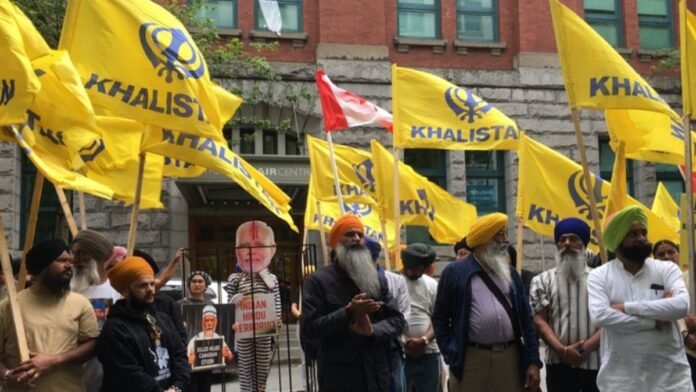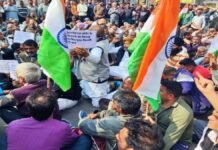
Key Points:
- Two separate attacks on Ontario theaters screening Indian films within one week
- Film.ca Cinemas cancels all Indian movie screenings after arson attempt and shooting
- Sikhs for Justice (SFJ) demands complete ban on “Made in India” films in Canada
- Multiple theaters across Greater Toronto Area now refusing to screen Indian movies
- Police investigate as targeted attacks but haven’t confirmed Khalistani involvement yet
- Theater CEO initially defiant but forced to prioritize safety after escalating threats
Toronto: A Canadian movie theater has become the target of escalating violence as masked attackers attempted arson and fired gunshots in two separate incidents targeting Indian film screenings. Film.ca Cinemas in Oakville, Ontario, was first attacked on September 25 at 5:20 AM when two suspects in black clothing poured flammable liquid from red gas cans at the theater entrance and ignited it, causing moderate damage to the exterior. Security footage showed a grey SUV circling the premises multiple times before the masked perpetrators arrived with jerrycans to execute their plan.
The violence escalated on October 2 when a lone gunman, described by Halton Regional Police as a heavy-built male in all-black clothing and face mask, fired multiple rounds at the theater’s entrance doors at 1:50 AM. Both attacks occurred outside operating hours, suggesting the intent was property damage and intimidation rather than harming patrons directly.
SFJ Issues Ultimatum to Canadian Government
The designated terror group Sikhs for Justice (SFJ), led by Gurpatwant Singh Pannun, released a statement demanding the Canadian government ban all “Made in India” films. Pannun claimed that the “Make in India” label had become “a political tool of the Modi regime rather than a cultural symbol,” warning that “every screening and every product stamped ‘Made in India’ carries the imprint of a violent ideology that is driving India toward a Hindutva totalitarian state”. The organization threatened dire consequences if their demands weren’t met, demonstrating the brazen nature of Khalistani terror operations in Canada.
Theater Forced to Cancel Indian Films
Initially defiant, Film.ca Cinemas CEO Jeff Knoll stated in a video message, “We are going to play what we want to play, when we want to play it”. However, facing escalating threats and violence, the theater was forced to withdraw screenings of popular Indian films including “Kantara: A Legend Chapter 1” and “They Call Him OG”. In a subsequent statement, theater management acknowledged that “evidence seems to show that the participation in the exhibition of South Asian films has led to these incidents”.
The theater stated: “While we do not wish to bow to threats, the situation has escalated to the point where we must take every precaution to protect our community”. Following Film.ca’s decision, York Cinemas also announced the cancellation of all Indian movie screenings, citing safety concerns for employees and guests.
Police Investigation and Broader Pattern
Halton Regional Police are investigating both incidents as targeted attacks but have not officially confirmed the motive or identified suspects. The attacks follow a disturbing pattern of Khalistani extremist activities across Canada, including previous threats against Hindu temples in the Oakville area. Sources suggest the incidents may be linked to broader tensions within extremist groups operating in the Greater Toronto Area.
The attacks have highlighted Canada’s struggle with domestic terrorism as authorities focus resources on the Bishnoi syndicate while Khalistani elements operate with apparent impunity. The incidents represent a significant escalation from mere threats to actual violence targeting cultural expression and Indian diaspora entertainment.
Impact on Indian Cinema Distribution
The terror campaign has effectively achieved its goal of suppressing Indian cultural content in Canadian theaters. Multiple venues across Ontario are now reconsidering their South Asian film programming, creating a chilling effect on cultural expression. The attacks have exposed the vulnerability of Indian cultural institutions in Canada and raised serious questions about the government’s ability to protect freedom of expression from extremist intimidation.





















































